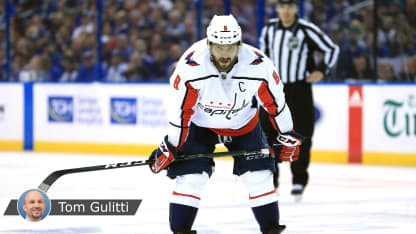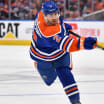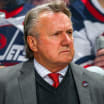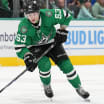Ovechkin hungry to win Stanley Cup for Capitals against Golden Knights
Not going to Vegas for 'pool party,' out to deliver first title in Washington's 43-season history

The Capitals are in the Stanley Cup Final for the first time since 1998. They practiced in front of more than 6,000 fans Saturday before flying to Las Vegas, where they will face the Vegas Golden Knights in Game 1 of the best-of-7 series on Monday (8 p.m. ET; NBC, CBC, SN, TVAS).
"We've never been in this position before," Ovechkin said. "All my career, I played for this team, and we never get the success like that. The town is going nuts."
RELATED: [Golden Knights vs. Capitals Stanley Cup Final preview | Complete Golden Knights vs. Capitals series coverage]
Ovechkin, 32, has waited 13 NHL seasons for this moment. Despite all he's accomplished, setting Capitals records with 607 goals, 1,122 points, 229 power-play goals, 102 game-winning goals and many more, Ovechkin had never advanced beyond the second round in the Stanley Cup Playoffs until this season.
As captain and Washington's biggest star, he took more than his share of the blame. Now, he's
four wins from bringing the Capitals the first championship in their 43-season history.
"Every time when the season starts you have a goal, right? To reach the playoffs," Ovechkin said. "You reach the playoffs, and then the next step is to win the Cup. This organization, it's been too long to be in this position, and I've never been in this position. Only Brooks Orpik has won the Stanley Cup and been in the Final. Now, this group is excited and we're ready to go."
And don't think Ovechkin is satisfied just getting to his first Cup Final.
"We're going (to Vegas) to play hockey, not to pool party and play in casino," Ovechkin said. "We're going there to play hockey and do our thing, and then we're going to have all the summer and whatever we want to do, we can do it."
\\*
Growing up in Moscow, Ovechkin was aware of the Stanley Cup and Russian players that won it, but his knowledge of what it takes to win it was limited.
"We play hockey. Everybody was talking about it," Ovechkin said. "But back then it was pretty hard to watch because it's not like right now. You've got the cell phones, internet and all that. Back then, you had newspapers and basically videotape, that's it."
When Ovechkin joined the Capitals for his first NHL season in 2005-06, he took the League by storm as a 20-year-old, scoring 52 goals. But the Capitals finished in last place in their division each of his first two seasons.
He reached the playoffs for the first time in 2007-08, and the Capitals lost to the Philadelphia Flyers in the first round. The next season, the Capitals advanced to the second round, when they lost to Sidney Crosby and the Pittsburgh Penguins in seven games.
That was the first of three times the Penguins defeated Ovechkin's Capitals on the way to winning the Stanley Cup (also 2016, 2017).
Former Capitals goaltender Olie Kolzig, who was teammates with Ovechkin his first three seasons in the NHL, believes Ovechkin's initial postseason experiences gave him a better understanding of what the Stanley Cup is all about.
"You get your taste of NHL playoffs and you get a disappointment like when you lose to Pittsburgh, and then it happens again and then you see your archrival, Crosby, win three Cups while you haven't won one yet," Kolzig said. "Then it really starts to fuel the fire. So I think it's definitely something that has grown in him the longer he's played over here."
The 2017 loss to the Penguins was a low point for Ovechkin and Capitals. They had won the Presidents' Trophy in consecutive seasons but couldn't get past Pittsburgh either time, and it appeared their championship window was closing.
Ovechkin scored 33 goals in the regular season -- his lowest total in a full season since he had 32 in 2010-11 -- and there was talk that his days as an elite player were behind him. While visiting his son in Russia last summer, Capitals coach Barry Trotz went to Moscow to meet with Ovechkin.
"We talked about a couple things and redefining himself a little bit," Trotz said. "There was a lot of people doubting that he still had what it took, and I think the great players take exception to that. A lot of things were said at the end of last year in the press, Twitter, whatever, all the social medias, all that, and they're hurtful and I think he took it personally.
"He said, 'I'm going to show you I'm still a great player,' and he did."
\\*
Ovechkin showed up early for training in September and, after changing his offseason training to focus more on quickness, looked to have regained some of the speed he was missing in 2016-17. He scored seven goals in his first two games and never looked back, finishing with 49 goals to lead the NHL for the seventh time in his career.
He's continued to produce in the postseason. He's second in the NHL in playoff goals with 12 (behind Winnipeg Jets center Mark Scheifele's 14) and in points with 22 (behind teammate Evgeny Kuznetsov's 24). But the difference in his play this postseason has been in his commitment to playing within the Capitals' defensive system.
"I think the way he plays this year is more within the team structure," Washington general manager Brian MacLellan said. "This is the most systematic he's played throughout his career, in my mind."
Dainius Zubrus, one of Ovechkin's early mentors and his linemate his first two NHL seasons, has noticed this as well. The circling in the defensive zone that some goal-scorers do to maintain some of their speed has been eliminated.
Zubrus watched Ovechkin dominate in Games 6 and 7 of the Eastern Conference Final against the Tampa Bay Lightning when the Capitals faced elimination. In a 3-0 win in Game 6, Ovechkin didn't have a point but set a tone with his forechecking, physicality (four hits) and commitment in the defensive end. He scored 1:02 into Game 7, and the Capitals won 4-0.
"He does everything everybody else does," Zubrus said. "Watching him stopping and starting and being honest in his position and then once he needs to go, he gets going. In Game 6, forechecking and hitting and shooting and running around, the whole thing, I'm sure the team fed off that a lot."
\\*
MacLellan said some of Ovechkin's maturation as a player can be attributed to him settling down off the ice and getting married to his wife, Nastya, in 2016.
"I think she's been a good influence on him, personally, and maybe it has translated into his performance on the ice," MacLellan said.
Whatever the reason, Ovechkin's commitment to winning is no longer being questioned. His critics will be forever silenced if the Capitals defeat the Golden Knights to win the Stanley Cup, but he's not concerned with that.
"You know what? I'm not at that age to listen to [the media] or listen to the fans to say, 'This guy is bad' or 'This guy is bad,'" Ovechkin said. "If you listen to it, it goes in one ear and it goes out a different ear. It doesn't stay in your mind."
Trotz doesn't believe Ovechkin needs to win the Stanley Cup to ensure his legacy.
"You don't define Alex Ovechkin because of a Cup or no Cup because he's inspired a lot of players to play the game," Trotz said. "He's going to be a Hall of Famer, a first-ballot Hall of Famer. He's done unbelievable things in his time in the League, and too many people try to define what he's really done in the game. He saved the game, him and Sid probably, out of the (2004-05) lockout. He's done so many things."

















